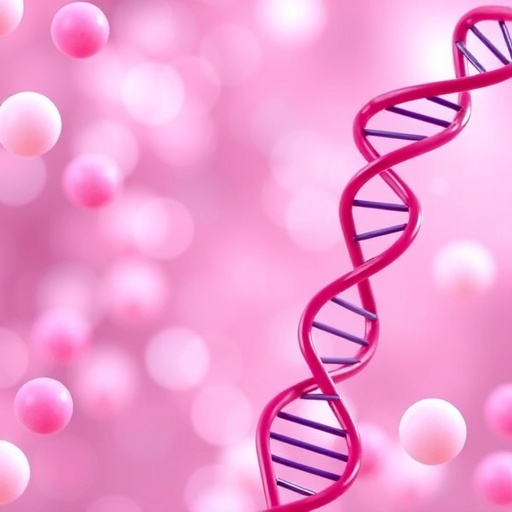In a groundbreaking study published in the Journal of Translational Medicine, researchers led by Song, N., Xi, X., and Zhang, K. have unveiled critical insights into the intersection of pharmacovigilance and genetics. Their research focuses on understanding the complex relationship between autoimmune diseases, the medications used to treat them, and the subsequent risk of breast cancer in women. This illuminating investigation may redefine the way healthcare providers approach treatment protocols for patients with autoimmune disorders.
The researchers utilized extensive data analytics to examine a significant number of pharmacovigilance reports, which detail the adverse effects of drugs. By correlating these reports with genetic data, they aimed to pinpoint particular medications that not only manage autoimmune conditions but may contribute to an increased risk of breast cancer. Such insights could be essential for tailoring drug choices to mitigate potential long-term health risks.
Breast cancer remains one of the leading cancers affecting women globally, and the complexities surrounding its etiology are compounded when considering pre-existing autoimmune diseases. Autoimmune disorders, such as lupus or rheumatoid arthritis, require continuous treatment, often involving immunosuppressive drugs. However, the long-term implications of these treatments on cancer risk is an area that has not been comprehensively studied until now.
The researchers turned to pharmacogenomics—the study of how genes affect a person’s response to drugs—to unravel this relationship. By focusing on specific genotypes, they scrutinized the safety profiles of various drugs used to manage autoimmune diseases. Their method highlights the importance of personalized medicine, which tailors drug therapies based on genetic profiles, potentially reducing adverse side effects and improving outcomes.
One of the most significant findings from the study was the identification of specific drugs whose use correlated with elevated breast cancer risk in certain genetic subgroups. The implications of these findings are profound, signaling a need for healthcare providers to reassess treatment regimens for women with autoimmune diseases who also have a family history of breast cancer or other risk factors.
In addition to dissecting the pharmacological impacts, the study also stressed the importance of regular screenings for breast cancer in this vulnerable population. Understanding the role that certain medications play could enhance monitoring strategies and encourage proactive approaches to cancer prevention among women with autoimmune conditions.
Moreover, the researchers emphasized the necessity of robust patient education. With this knowledge, doctors could engage in informed discussions with their patients about the risks and benefits of different treatment options. Empowering patients with information can lead to better adherence to treatment plans and more vigilant self-monitoring for signs of breast cancer.
Furthermore, this research advocates for the integration of genetic screening within standard care practices for patients on long-term immunosuppressive therapies. Identifying high-risk patients before prescribing certain drugs could drastically alter outcomes, promoting a more extensive discussion regarding alternative therapies that may carry less risk.
As the field of pharmacovigilance continues to evolve, the findings from this study underscore a critical need for further exploration into drug safety databases, particularly concerning demographic differences and genetic predispositions. This approach could pave the way for future studies aimed at refining treatment protocols and ultimately improving healthcare delivery standards.
The substantial contribution made by Song and colleagues to this niche area of research highlights a growing awareness of the intersection between genetics and pharmacotherapy. Their comprehensive analysis not only lays the groundwork for future investigations but also urges regulatory bodies to take a closer look at drug approval processes concerning long-term safety profiles.
The collaboration among geneticists, pharmacologists, and oncologists is essential to promote an interdisciplinary approach to patient care. Bringing these fields together can foster an enriched understanding of how best to serve women at this crossroads of autoimmune treatments and cancer risk.
In conclusion, the implications of this research are vast and multi-faceted. It opens the door to a future where personalized medicine becomes the standard, catering to the unique health profiles of patients. The potential for reducing breast cancer risk through informed pharmacological strategies represents a promising frontier in women’s health.
Researchers are optimistic that the discussions sparked by this study will inspire further investigations and collaborations in the field. As we strive for a more personalized approach to medicine, the findings may ultimately lead to improved health outcomes for thousands of women grappling with the dual challenges of autoimmune diseases and breast cancer risk.
With increased awareness and education surrounding these issues, healthcare providers can better equip themselves to engage in meaningful conversations with their patients. The need for ongoing research and dialogue remains pivotal to enhancing patient care and fostering a deeper understanding of the relationships between drugs, genes, and cancer risk.
As the scientific community absorbs these insights, it is hoped that the future will hold fewer uncertainties for women facing these challenging health landscapes. The potential for tailored treatment options and improved preventive measures heralds a new chapter in the journey toward better health for those affected by autoimmune conditions alongside cancer concerns.
Subject of Research: Investigating the drugs and indications for breast cancer risk in women with autoimmune diseases
Article Title: Bridging pharmacovigilance and genetic insight: investigating drugs and indications for breast cancer risk in women with autoimmune diseases.
Article References:
Song, N., Xi, X., Zhang, K. et al. Bridging pharmacovigilance and genetic insight: investigating drugs and indications for breast cancer risk in women with autoimmune diseases.
J Transl Med 23, 1332 (2025). https://doi.org/10.1186/s12967-025-07338-w
Image Credits: AI Generated
DOI: https://doi.org/10.1186/s12967-025-07338-w
Keywords: Pharmacovigilance, breast cancer, autoimmune diseases, genetic insight, personalized medicine, immunosuppressive therapy




